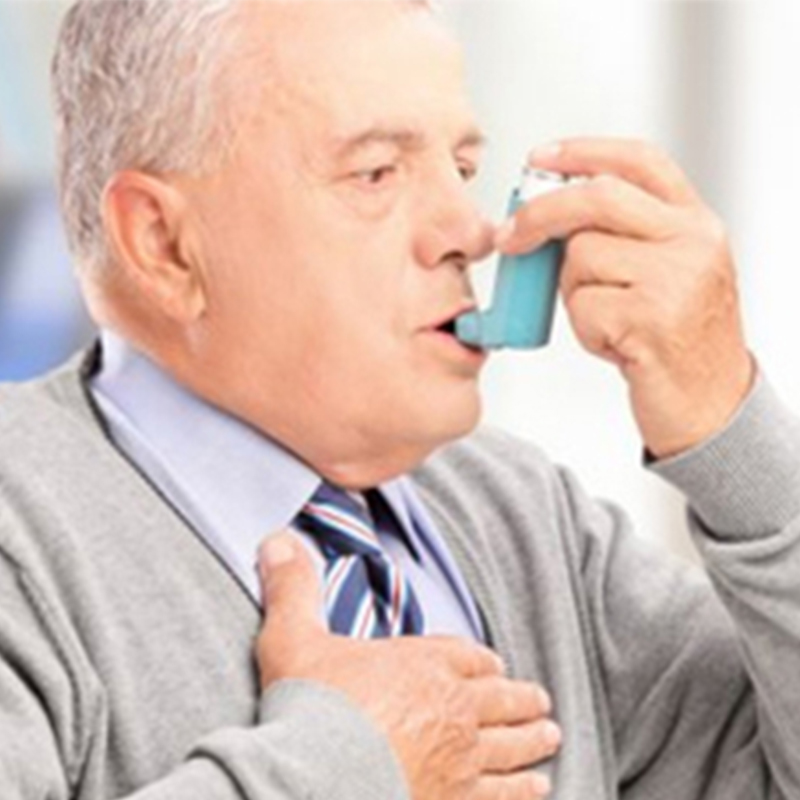
Asthma
It is defined as an episodic chronic respiratory disorder in which there is airflow obstruction causing difficulty in breathing, cough, wheeze and chest tightness. It is a very common disorder affecting children more than adults. For some, the condition is mild with infrequent episodes & for others it is a serious medical emergency. An episode may pass away quickly and may be short lasting or at times lasts longer & requires immediate medical help.
CAUSES
Hereditary & familial tendency or history of allergy, which may be skin allergy also predisposes to asthma in the offsprings. Allergy mostly inhaled is the most common cause of asthma.
ALLERGENS CAN BE
- Environment - smoke, dust & pollution and petrol fumes.
- Pollen and molds from grass, flowers and trees.
- Strong perfumes.
- Paints & varnishes.
- Tobacco smoke.
- Animal dander.
- House dust mite.
- Chemical fumes.
FOOD, WHICH CAN BE CAUSE ALLERGY ARE
- Sour food
- Citrus fruits
- Cold food & drinks
- Artificially colored & flavored foods
- Fish
- Beer, wine.
- Vinegar
- Grapes
- Canned vegetables
Infection of the lung, which can be bacterial, viral predisposes to asthma.Emotional stress is a known trigger factor for an asthmatic attack. Over strenuous exercise and inhalation of cold air and climatic changes are also trigger factors as are certain drugs like aspirin.
SYMPTOMS
Initially there is a feeling of restlessness with a painless tightness in the chest.There may be cough, sometimes with phlegm and a wheezing or whistling sound when breathing. Mild to moderate shortness of breath with a feeling of anxiety, sweating and inability to lie down on the back. Usually the sufferer finds comfort in sitting bent forwards and near the windows.
CLINICAL GUIDELINES
- Get plenty of rest, so try lying on the side that lets you breathe the best.
- Sip hot liquids and drink plenty of fluids.
- Apply moist heat by holding a warm, wet towel against your face or breathing in steam through a cloth or towel.
- Do not neglected common cold or any infection of the respiratory system and do not go near persons having any respiratory infection.
- Do not self medicate.
- Ensure that there is adequate ventilation in your room or at your work place.
- Do not go near dusty and polluted areas.
- Identify the allergen, if possible and try to avoid it.
- Use of special bed and pillow coverings and regular laundering of bed clothes.
- Avoid dust and pollution.
- Avoid smoking- or quitting if you do smoke- can greatly decrease the risk of this disease.
- Do not keep pets at home.
- Avoid perfumes, perfumed cosmetics, agarbatti, mosquito coils with strong odour.
DO'S AND DON'TS
Try to recognize the trigger factors that bring on your attack, so that you can avoid them. In families with history of allergy (asthma, eczema), avoid artificial milk, eggs, cocoa, juices & wheat preparations till completion of 6 months. In such circumstances you can only breast feed till 6 months. Do breastfeed your baby for the first 6 months to strengthen the immune system and avoid contact with allergens such as in cow's milk.Avoid foods & drinks that are known to cause a problem such as vinegar, lemon juice, grapes, instant tea, corn syrup, fruit toppings, cold food & drink, canned vegetables, beer and wine Avoid smoke, pollution, dust as far as possible.There are three steps to be taken when dealing with an allergy. Firstly, identify the cause or allergen Secondly, avoid it. Thirdly, if avoidance is impossible, treat the symptoms. Keep a diary and try to trace a pattern or relation between your allergic reaction and the allergen. E.g. Sneezing while doing housework could mean you are allergic to house dust. Take steps to deal with stress, anxiety and tension as these can influence the frequency and severity of symptoms Good nutrition, balanced diet, adequate rest and relaxation will be beneficial.Yoga can help you by breathing exercises.